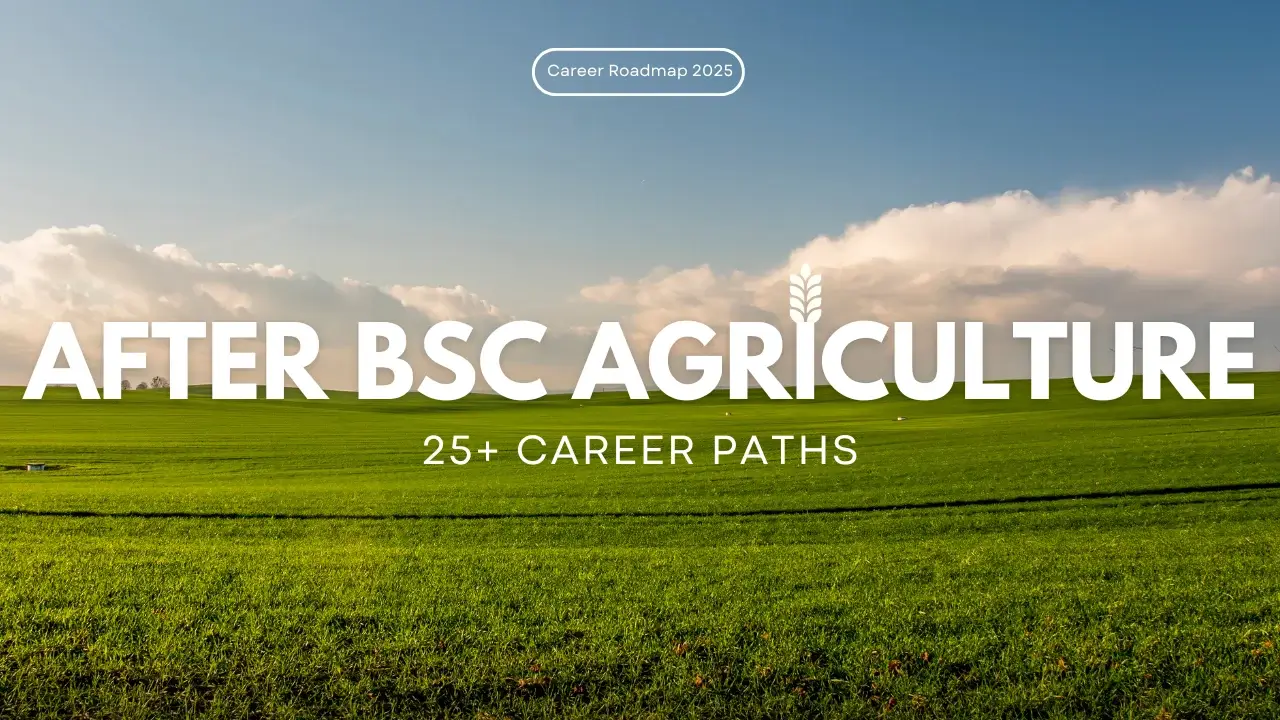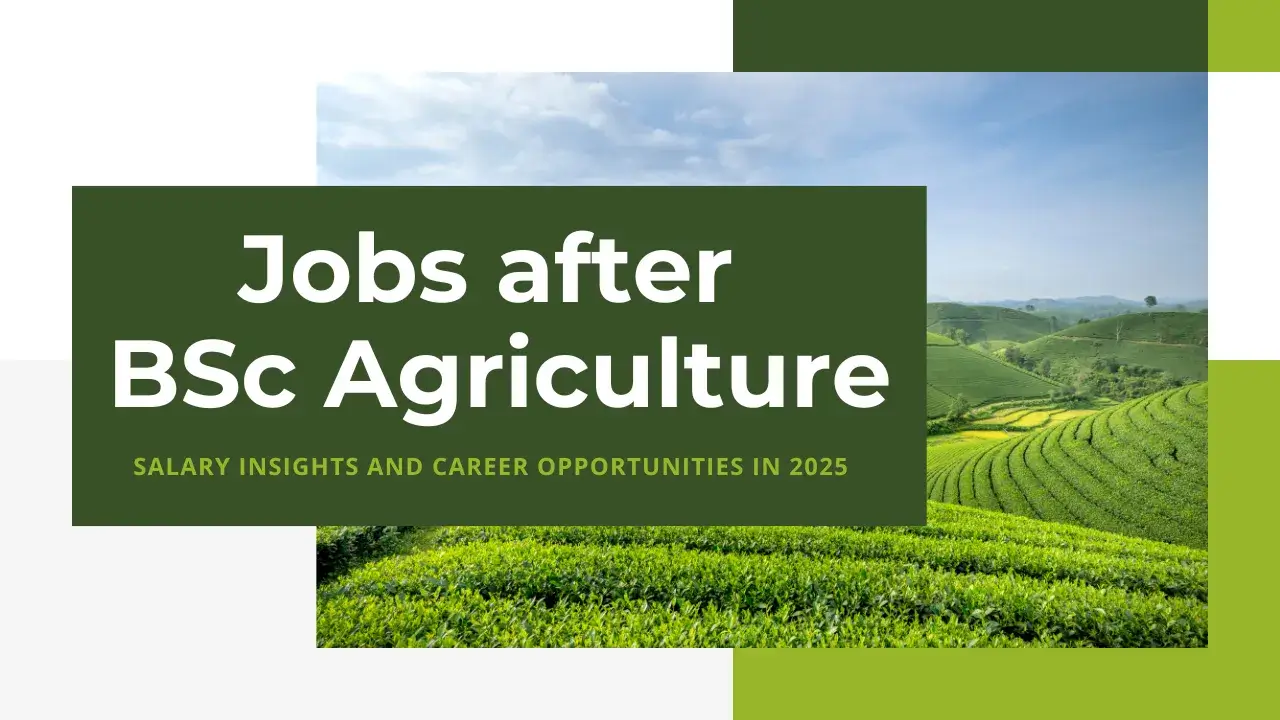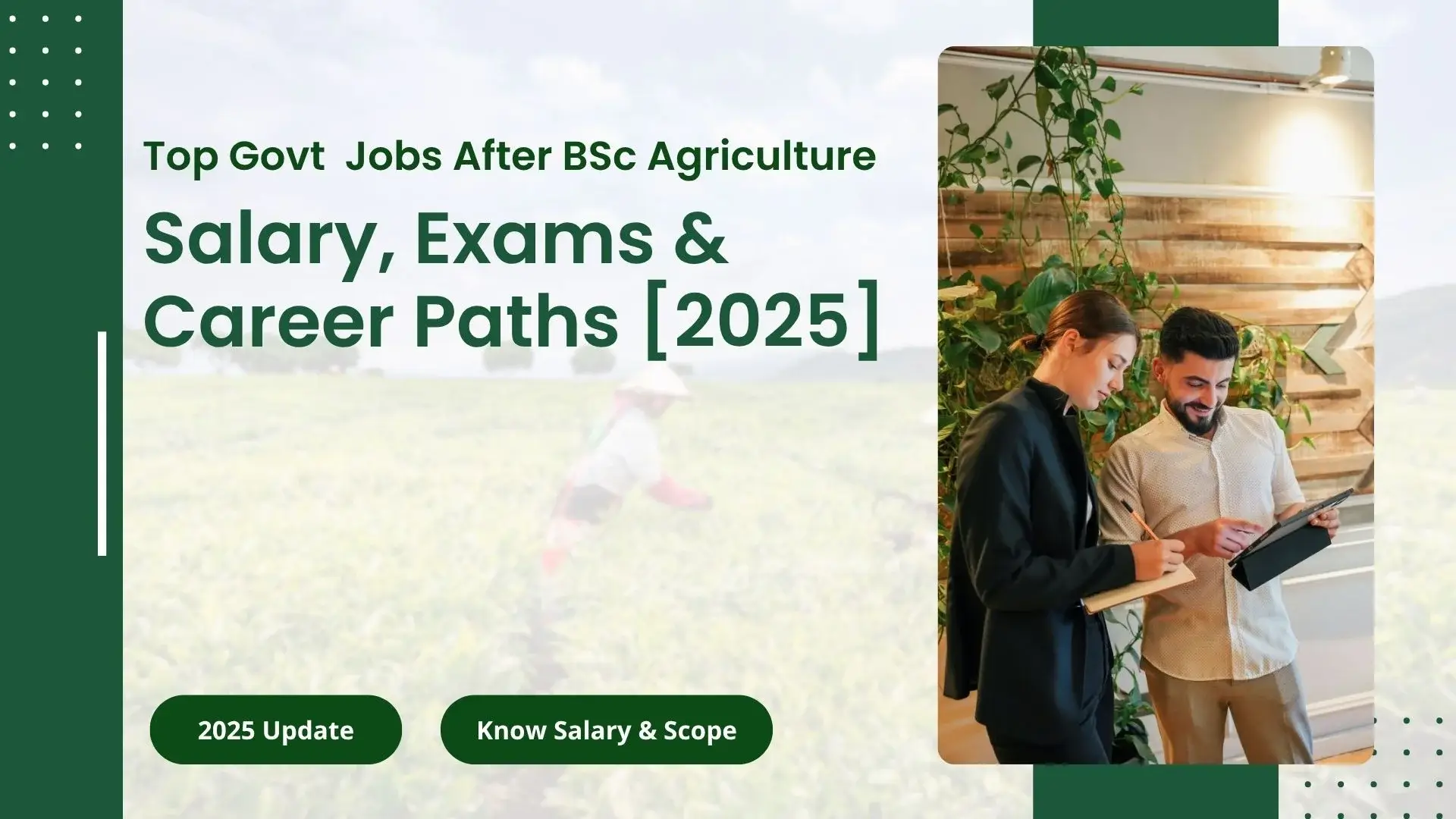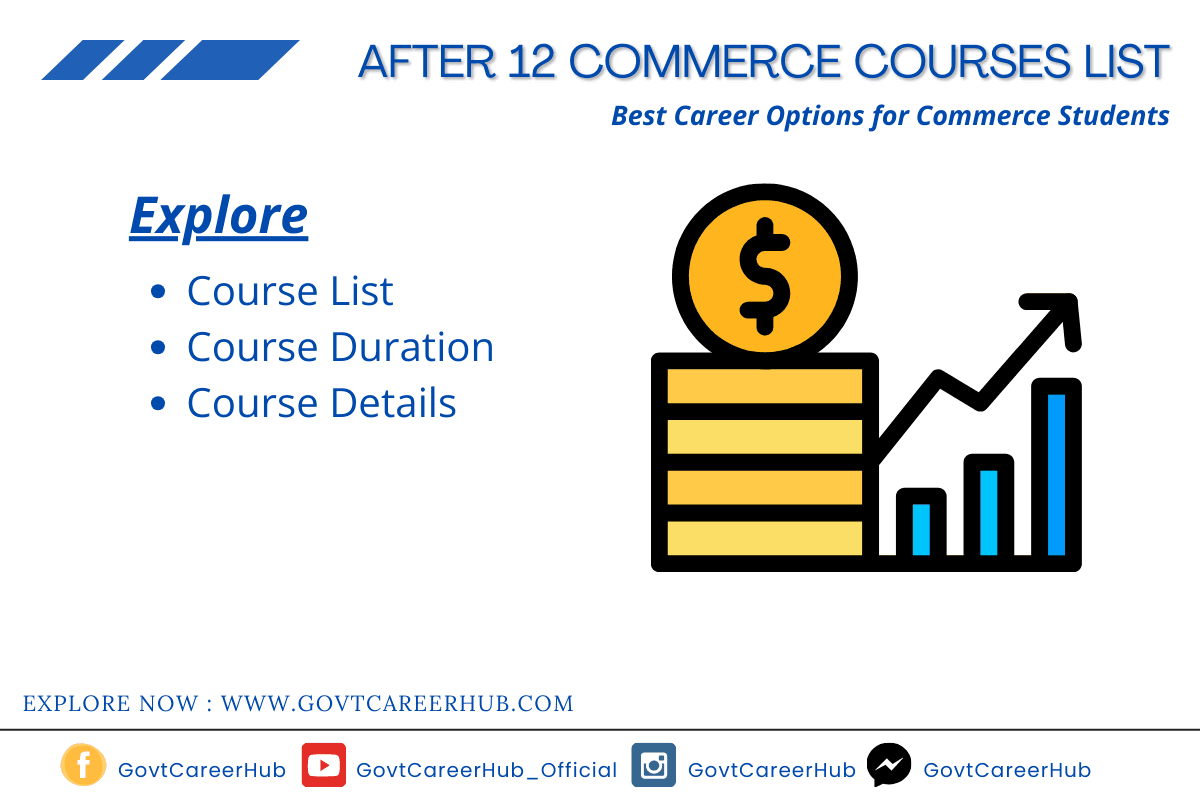Last Updated: June 6, 2025 at 3:32 pm
You’ve completed your BSc Agriculture, and now you’re standing at a crossroads wondering “After BSc Agriculture Which Course is Best?” This comprehensive guide will help you navigate through every possible career option after BSc Agriculture, ensuring you make an informed decision that aligns with your goals, interests, and financial situation.
With India’s agricultural sector contributing over ₹50 lakh crores to the economy and employing 45% of the workforce, the career opportunities after BSc Agriculture are vast and varied. From traditional farming roles to cutting-edge agritech positions, from government services to international opportunities, your agriculture degree opens doors to numerous rewarding career paths.
- Understanding Your Post-BSc Agriculture Journey
- Complete Course Options After BSc Agriculture
- Career-Specific Course Recommendations
- Emerging High-Demand Career Fields
- State-Wise Career Opportunities
- Course Selection Framework
- Success Stories and Career Paths
- Entrance Exam Preparation Strategy
- Financial Aid and Scholarships
- Building Your Professional Network
- Technology Skills for Modern Agriculture
- Regional Language Advantages
- Gender-Specific Opportunities
- Frequently Asked Questions
- Your Next Steps: Action Plan
- Choosing Your Path Forward
Understanding Your Post-BSc Agriculture Journey
Before exploring specific courses, let’s understand what you’re really looking for:
Are you seeking:
- Higher studies for academic excellence and research?
- Professional courses for immediate job placement?
- Government job preparation and competitive exam success?
- Entrepreneurship and business opportunities?
- International career prospects?
- Specialized technical skills in emerging fields?
Your answer determines your ideal course selection after BSc Agriculture.
Complete Course Options After BSc Agriculture
Academic Excellence Path: Master’s Degree Programs
| Course Name | Duration | Entrance Exam | Average Salary | Career Opportunities |
| MSc Agriculture (Agronomy) | 2 Years | ICAR AIEEA-PG | ₹4-8 LPA | Research Scientist, Extension Officer, Crop Consultant |
| MSc Agriculture (Soil Science) | 2 Years | ICAR AIEEA-PG | ₹4-9 LPA | Soil Analyst, Fertilizer Companies, Government Labs |
| MSc Agriculture (Plant Breeding) | 2 Years | ICAR AIEEA-PG | ₹5-10 LPA | Seed Companies, Biotech Firms, Research Institutes |
| MSc Agriculture (Entomology) | 2 Years | ICAR AIEEA-PG | ₹4-8 LPA | Pesticide Companies, IPM Specialist, Quality Control |
| MSc Agriculture (Plant Pathology) | 2 Years | ICAR AIEEA-PG | ₹4-9 LPA | Disease Diagnostician, Biocontrol Specialist, R&D |
| MSc Horticulture | 2 Years | ICAR AIEEA-PG | ₹4-8 LPA | Export Houses, Landscaping, Processing Industries |
| MSc Forestry | 2 Years | ICAR AIEEA-PG | ₹3-7 LPA | Forest Department, Wildlife Conservation, Eco-tourism |
| MSc Agricultural Economics | 2 Years | ICAR AIEEA-PG | ₹5-12 LPA | Policy Research, Banking, Development Organizations |
| MSc Food Science & Technology | 2 Years | ICAR AIEEA-PG/GATE | ₹5-12 LPA | Food Processing, Quality Control, Product Development |
| MSc Agricultural Biotechnology | 2 Years | ICAR AIEEA-PG | ₹6-15 LPA | Biotech Companies, Pharmaceutical, Research Labs |
Professional Management Path
| Course Name | Duration | Entrance Exam | Average Salary | Career Scope |
| MBA Agribusiness | 2 Years | CAT/MAT/CMAT | ₹8-20 LPA | Agritech Companies, Supply Chain, Rural Banking |
| MBA Rural Management | 2 Years | CAT/XAT | ₹7-18 LPA | NGOs, Government Projects, Microfinance |
| PGDM Agriculture & Food Business | 1-2 Years | Institute Specific | ₹6-15 LPA | Food Processing, Export Business, Retail |
| MBA Food & Agribusiness | 2 Years | CAT/GMAT | ₹8-22 LPA | Multinational Companies, Consulting, Trading |
| Executive MBA (For Working Professionals) | 2 Years | Work Experience | ₹10-25 LPA | Senior Management, Entrepreneurship |
Technical & Engineering Path
| Course Name | Duration | Entrance Exam | Average Salary | Specialization Areas |
| MTech Agricultural Engineering | 2 Years | GATE | ₹6-12 LPA | Farm Mechanization, Irrigation, Food Processing |
| MTech Food Technology | 2 Years | GATE | ₹7-15 LPA | Food Safety, Processing Equipment, Quality Systems |
| MTech Soil & Water Engineering | 2 Years | GATE | ₹6-12 LPA | Irrigation Design, Water Management, Drainage |
| MTech Farm Machinery & Power | 2 Years | GATE | ₹7-14 LPA | Equipment Manufacturing, Precision Agriculture |
| MTech Agricultural Process Engineering | 2 Years | GATE | ₹8-16 LPA | Post-Harvest Technology, Processing Industries |
Specialized Professional Courses
| Course Name | Duration | Investment | Career Potential | Market Demand |
| Certified Organic Agriculture | 6 Months-1 Year | ₹50K-2L | ₹5-12 LPA | High – Export Market |
| Precision Agriculture & IoT | 6-12 Months | ₹1-3L | ₹8-20 LPA | Very High – Tech Integration |
| Agricultural Drone Technology | 3-6 Months | ₹2-5L | ₹6-15 LPA | High – Modern Farming |
| Greenhouse Management | 6 Months | ₹1-2L | ₹4-10 LPA | Medium – Protected Cultivation |
| Mushroom Production Technology | 3-6 Months | ₹50K-1L | ₹3-8 LPA | Medium – Alternative Crops |
| Hydroponics & Vertical Farming | 6 Months | ₹2-4L | ₹6-18 LPA | High – Urban Agriculture |
| Agricultural Data Analytics | 8-12 Months | ₹3-6L | ₹10-25 LPA | Very High – Digital Agriculture |
| Supply Chain Management | 6-12 Months | ₹2-4L | ₹7-16 LPA | High – Logistics |
International Study Options
| Program | Duration | Investment | Global Opportunities |
| MS Agriculture (USA) | 2 Years | ₹25-50L | Research, Agritech Companies, International Organizations |
| MSc Sustainable Agriculture (Europe) | 1-2 Years | ₹15-35L | Climate-Smart Agriculture, Development Projects |
| Master of Agricultural Science (Australia) | 2 Years | ₹20-40L | Research, Government Agencies, Private Sector |
| MS Food Science (Canada) | 2 Years | ₹20-45L | Food Industry, Regulatory Bodies, Research |
| Agricultural Development (Netherlands) | 2 Years | ₹25-45L | International Development, Policy Research |
Government Job Preparation Courses
| Position | Exam | Salary Range | Preparation Duration |
| Agricultural Field Officer (AFO) | State PSC | ₹3-6 LPA | 6-12 Months |
| IBPS SO Agriculture | IBPS | ₹4-8 LPA | 8-12 Months |
| FCI Technical Officer | FCI Exam | ₹5-9 LPA | 6-10 Months |
| NABARD Grade A & B | NABARD | ₹6-15 LPA | 12-18 Months |
| ICAR Scientist | ICAR-ASRB | ₹7-12 LPA | 1-2 Years |
| Forest Range Officer | State Exam | ₹4-8 LPA | 8-12 Months |
| Agricultural Research Service (ARS) | ICAR-ASRB | ₹8-15 LPA | 1-2 Years |
Career-Specific Course Recommendations
For Research & Academic Careers

If you dream of becoming a scientist or professor, focus on:
- MSc in your area of interest followed by PhD
- NET/JRF qualification for research fellowships
- International research exposure through exchange programs
- Publication and conference participation
Timeline: 4-6 years for PhD completion Investment: ₹2-8 lakhs (with scholarships available) Career Peak: Research Director, University Professor (₹15-30 LPA)
For Corporate & Management Roles
Business-minded students should consider:
- MBA in Agribusiness from top institutions
- Industry internships during studies
- Leadership and communication skill development
- International business exposure
Timeline: 2-3 years including preparation Investment: ₹8-25 lakhs Career Peak: CEO, Business Head (₹25-50 LPA)
Read Also: Govt Jobs After BSc Agriculture Salary: Top Posts, Pay Scale & Career Scope [2025]
For Government Service

Aspiring civil servants should focus on:
- MSc Agriculture for technical positions
- Dedicated exam preparation with coaching
- Current affairs and general studies
- Interview and personality development
Timeline: 1-3 years preparation Investment: ₹2-5 lakhs Career Peak: Secretary, Director (₹20-35 LPA)
For Entrepreneurship
Future entrepreneurs should pursue:
- MBA or business-oriented courses
- Specialized technical certifications
- Practical farming experience
- Business plan development
Timeline: 1-2 years preparation Investment: ₹5-50 lakhs (business dependent) Career Peak: Unlimited earning potential
For International Careers
Global career aspirants should consider:
- International master’s programs
- Language proficiency (IELTS/TOEFL)
- Cultural adaptation skills
- Global agriculture exposure
Timeline: 2-4 years Investment: ₹20-50 lakhs Career Peak: International consultant, Global company executive
Read Also:
Private Jobs after BSc Agriculture Salary: Salary Insights and Career Opportunities in 2025
Private Jobs after BSc Agriculture Salary is a key consideration for graduates exploring career opportunities…
Govt Jobs After BSc Agriculture Salary: Top Posts, Pay Scale & Career Scope [2025]
Completing your BSc Agriculture degree opens doors to numerous rewarding government career opportunities in India….
Emerging High-Demand Career Fields
Digital Agriculture & Technology
The fusion of agriculture with technology creates exciting opportunities:
- Agricultural software development
- Precision farming consultancy
- Drone-based crop monitoring
- AI/ML in agriculture
- Blockchain in supply chain
Skills Required: Programming, data analysis, IoT understanding Salary Range: ₹8-25 LPA Growth Potential: Exponential in next 5-10 years
Climate-Smart Agriculture
With climate change concerns, this field is booming:
- Carbon farming consultancy
- Sustainable agriculture advisory
- Climate risk assessment
- Renewable energy in agriculture
- Water conservation specialist
Skills Required: Environmental science, policy understanding, data analysis Salary Range: ₹6-18 LPA Growth Potential: Very high due to government focus
Food Safety & Quality
Growing consumer awareness drives demand:
- Food safety auditor
- Quality assurance manager
- Regulatory affairs specialist
- Traceability system developer
- Certification consultant
Skills Required: Food technology, regulatory knowledge, auditing skills Salary Range: ₹5-15 LPA Growth Potential: Steady growth with food industry expansion
State-Wise Career Opportunities
Punjab & Haryana
- Crop consultancy for wheat-rice systems
- Farm mechanization services
- Agri-input dealership
- Contract farming coordination
Maharashtra & Gujarat
- Horticulture export business
- Sugar industry management
- Precision agriculture services
- Agricultural finance sector
Tamil Nadu & Karnataka
- IT-Agriculture integration
- Flower cultivation and export
- Agri-startups ecosystem
- Research institutions
Uttar Pradesh & Bihar
- Extension services
- Rural development projects
- Organic farming promotion
- Government schemes implementation
Course Selection Framework
Step 1: Self-Assessment
Interest Areas:
- Field work vs. office work
- Technical vs. managerial roles
- Research vs. practical application
- Individual vs. team work
Strengths Evaluation:
- Academic performance in specific subjects
- Practical skills and hands-on experience
- Communication and leadership abilities
- Problem-solving and analytical thinking
Step 2: Market Research
Industry Trends:
- Growth sectors in agriculture
- Salary trends in different fields
- Job availability in your preferred location
- Future prospects and career progression
Skill Gaps:
- Emerging skill requirements
- Technology adoption needs
- International market demands
- Government policy directions
Step 3: Financial Planning
Investment Capacity:
- Course fees and living expenses
- Opportunity cost of not working
- Loan availability and terms
- Scholarship opportunities
Return on Investment:
- Immediate salary expectations
- Long-term earning potential
- Job security and stability
- Entrepreneurship opportunities
Step 4: Risk Assessment
Career Risks:
- Market volatility in chosen field
- Technology disruption potential
- Geographic limitations
- Industry cyclical nature
Mitigation Strategies:
- Skill diversification
- Continuous learning approach
- Network building
- Multiple career options
Success Stories and Career Paths
From MSc to Research Leadership
Priya completed MSc Plant Breeding and joined ICRISAT as Junior Research Fellow. Today, she leads a team developing drought-resistant crops, earning ₹18 LPA plus international consulting income.
From MBA to Agritech Success
Rahul pursued MBA Agribusiness and joined a startup as Product Manager. He later founded his own precision agriculture company, now valued at ₹50 crores.
From Certification to Export Business
Sunita took organic farming certification and started with 2 acres. She now exports organic spices worth ₹5 crores annually, employing 50+ farmers.
From Government Job to Policy Making
Amit cleared NABARD Grade A and worked in rural credit. He’s now Additional Secretary in Agriculture Ministry, influencing national agricultural policies.
Entrance Exam Preparation Strategy
ICAR AIEEA-PG Preparation
Syllabus Coverage:
- BSc Agriculture subjects (60%)
- Current agricultural developments (20%)
- General knowledge and reasoning (20%)
Preparation Timeline: 6-8 months Success Rate: 15-20% selection ratio Coaching Options: Both online and offline available
MBA Entrance Exams (CAT/MAT/XAT)
Key Areas:
- Quantitative aptitude (40%)
- Verbal ability (30%)
- Logical reasoning (30%)
Preparation Timeline: 8-12 months Success Rate: Varies by institute (1-20%) Special Focus: Mock tests and time management
GATE Preparation
Engineering Mathematics: 15 marks Agriculture Core: 70 marks General Aptitude: 15 marks
Preparation Timeline: 10-12 months Success Rate: 15-18% qualify Strategy: Focus on basics and previous year questions
Financial Aid and Scholarships
Government Scholarships
- INSPIRE Fellowship for research students
- UGC NET-JRF for PhD scholars
- State government scholarships for postgraduate studies
- Minority scholarships for eligible students
Private Scholarships
- Merit-based scholarships from institutes
- Need-based financial aid
- Corporate scholarships from agricultural companies
- International scholarships for study abroad
Education Loans
- Nationalized banks offer education loans up to ₹50 lakhs
- Interest rates range from 8-12% annually
- Collateral requirements vary by loan amount
- Moratorium period during study and 6-12 months after
Building Your Professional Network
During Studies
- Join student organizations and agricultural societies
- Attend conferences and workshops in your field
- Connect with professors and industry guest speakers
- Participate in competitions and hackathons
After Graduation
- Professional associations like Indian Society of Agronomy
- Alumni networks from your institute
- LinkedIn connections with industry professionals
- Mentorship programs in your chosen field
Industry Engagement
- Internships during your course
- Project collaborations with companies
- Industry visits and study tours
- Guest lectures and industry interactions
Technology Skills for Modern Agriculture
Essential Digital Skills
- Microsoft Excel for data analysis
- GIS software for mapping and spatial analysis
- Statistical software (R, SPSS) for research
- Database management for record keeping
Emerging Technology Skills
- Python/R programming for data science
- IoT platform understanding
- Drone operation and data interpretation
- Mobile app development for agriculture
Soft Skills Development
- Communication skills for extension work
- Leadership abilities for team management
- Problem-solving approach for complex challenges
- Adaptability to changing technology and methods
Regional Language Advantages
Understanding local languages provides significant advantages:
- Better farmer communication in extension roles
- Cultural understanding for rural development
- Government job advantages in respective states
- Local business opportunities and networking
Gender-Specific Opportunities
For Women in Agriculture
- Women-focused government schemes and funding
- Leadership roles in women’s agricultural cooperatives
- Specialized areas like nutrition, home science integration
- Entrepreneurship support through various programs
Breaking Traditional Barriers
- Technology-enabled farming reducing physical constraints
- Management and consultancy roles leveraging analytical skills
- Research and development positions in laboratories
- Policy and advocacy roles in development organizations
Frequently Asked Questions
Your Next Steps: Action Plan
Immediate Actions (Next 30 Days)
- Complete self-assessment using the framework provided
- Research specific courses that align with your interests
- Connect with current students and alumni in your target fields
- Attend career counseling sessions at your current institution
Short-term Goals (3-6 Months)
- Register for entrance exams based on your course selection
- Start systematic preparation with proper study schedule
- Apply for scholarships and financial aid programs
- Gain relevant experience through internships or projects
Long-term Vision (1-2 Years)
- Complete course applications with strong SOPs and recommendations
- Develop necessary skills through additional certifications
- Build professional network through industry engagement
- Prepare for career transition with updated resume and portfolio
Choosing Your Path Forward
The agricultural sector offers unprecedented opportunities for growth, innovation, and impact. Whether you choose traditional academic paths, modern professional courses, or entrepreneurial ventures, success depends on aligning your choice with market demands and personal aspirations.
Remember that your career after BSc Agriculture is not just about personal success – you’re contributing to food security, sustainable development, and rural prosperity. The course you choose today shapes not only your future but also influences the lives of millions who depend on agriculture.
The key is to start with a clear understanding of your goals, thoroughly research your options, and commit fully to your chosen path. Every successful agricultural professional started where you are today – with a degree and a decision to make.
Your agricultural career journey is unique, and the perfect course for you might be different from others. Use this guide as your roadmap, but remember that adaptability and continuous learning will be your greatest assets in the dynamic world of modern agriculture.
Ready to transform your BSc Agriculture degree into a thriving career? The agricultural sector needs passionate, skilled professionals like you. Choose your path, prepare thoroughly, and step confidently into a future where your expertise can make a real difference in the world.
Take action today – your future in agriculture starts with the decision you make now. Whether it’s applying for entrance exams, connecting with professionals in your field of interest, or starting skill development courses, every step you take brings you closer to your ideal agricultural career.






